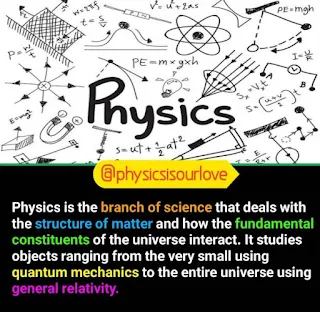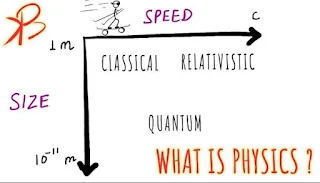This felt natural because this was his first experience of knowing and exploring a subject that he said was difficult by the name of physics. By definition, physics means to study something about matter, time, space, and energy.
From this it can be seen that this complicated physics is a branch of the natural sciences (science). Science that studies about things that move in this universe.
In its application, physics tries to reveal what is really happening around us. In other words, it can be said that physics is one of the sciences that requires realistic thinking and accurate calculations.
If done carelessly then the results obtained from the application of physics will not work. No wonder this branch of natural science must be studied properly. The adherents of this physical science are usually at the same time followers of the positivist philosophical school.
This branch of philosophy explains that everything that exists in this world can be said to be true if it can be proven scientifically. The truth that is proven by logical calculations and can be trusted.
Therefore, many of the adherents of this positivist philosophy have no longer questioned what physics is. This is because they have been able to prove for themselves what is happening around them with ratios and accurate calculations using the principles in physics.
What is Physics?
Historically, physics began to appear around the 19th century. At that time the development of science, knowledge, and philosophy was growing rapidly.
Physics itself is part of science (the study of nature) which is better known as natural philosophy. Because as explained above, physics was created to rationalize what is happening in the universe through scientific facts and accurate calculations.
From this it can also be seen that physics is a pure science that is the most basic. So anything that results from research using this philosophical ratio calculation will definitely review matter and energy which are basically the basic constituents of the universe, even the universe.
Because the facts obtained from this physical research are always fundamental, from this it can be ascertained that from the physical sciences we are able to sort out and re-select new sciences which are branches of other sciences.
Even if we view physics as a building, then we can liken it to a pyramid. And as we know, the base of the pyramid is broad, to see it requires a broad view of it.
So that when the question arises what is physics, we can answer it clearly. The answers we give can be in the form of a broad view.
Because physics is also broader than other branches of science. The source of the study that is emphasized in physics must be comprehensive, starting from microscopic things to macroscopic things.
From the above, it is explained that in physics we also know various forms of energy and study the changes that occur in the energy. From one energy to another.
While other components of physics itself are supportive, such as space and time which play an important role as a framework for observing physics. So it can be said that physics is a discipline that requires extraordinary accuracy. Because the slightest miscalculation can change the results we will get.
What is Classical and Modern Physics?
Although sometimes what we research will not always lead to sweet things, or we can not always answer what happens in nature. We have to get through it. Because it turns out that in order to answer what physics is, we also have to look at the physics in terms of its breadth.
From this, it can be seen that broadly speaking, physics itself can be divided into two majors, namely modern physics and classical physics. In classical physics we are presented with the study of matter and energy where the phenomena are simple things that usually happen in our environment (normal conditions).
While in modern physics, we will be presented with things that are more complex. The discussion carried out is far from what we imagine, such as thermodynamics, mechanics, light, electromagnetics, and sound.
Everything that is discussed in modern physics, will definitely focus its studies on big things. Not infrequently what is studied is energy and matter which are often in extreme conditions or on a very large/small scale.
It is true that until now, we have been able to use modern physics to uncover the secrets of nature and at the same time answer what physics is about, but that is only a small part. Because it turns out that there are still many unanswered questions to this day. Or maybe the thing or phenomenon is still not reachable by the human brain.
To this day, these big things are still believed to be one way to answer the question of what physics is for those who don't want to focus on it. Because the focus of modern physics was extreme.
For example, the topic of quantum mechanics. Or there is also nuclear and atomic physics which is definitely not a small thing. Or again elementary particle physics (FPE) whose scale is smaller than atomic nuclei and atoms, this type of physics is usually with "high-energy physics".
Even in the study of classical physics, it is still not possible to answer everything that happens in everyday life. Therefore, it is necessary for people who are really interested in this branch of science to study physics thoroughly.
Because if this branch of science is not studied seriously it will have a major impact on the development of a theory or a belief. And no doubt eventually, the old questions of what physics is will happen again.
Thus a review of what physics is. Starting from a discussion of classical to modern physics. Hopefully the information presented is useful for readers.


